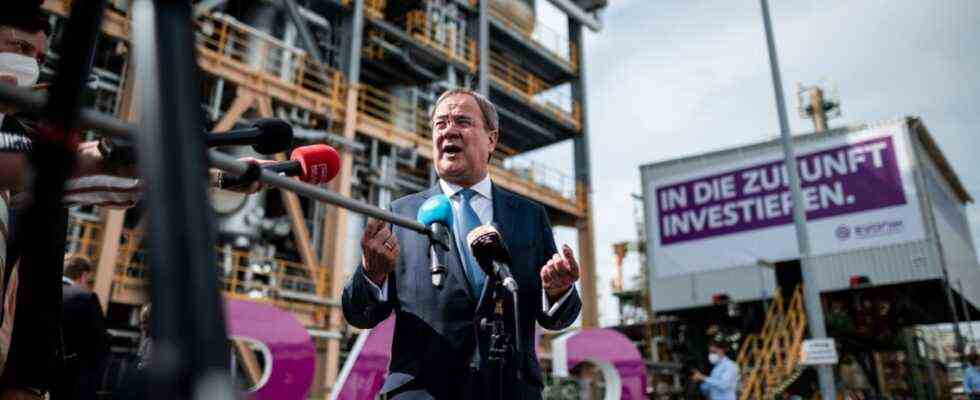The environment does not seem to support the state for a politician who wants to represent Germany on the world stage soon. But for Armin Laschet this is a home game on Thursday. The Prime Minister of North Rhine-Westphalia stands in a white marquee in the middle of the Marl Chemical Park in the Ruhr area, a bundle of factories and lines, tank cars and railroad tracks. “God’s blessing for the new facility,” calls out the CDU candidate for chancellor. With the new plastics production facility, Evonik is making “an important contribution to the future of the Ruhr area,” says Laschet, and even more: “A huge contribution to the fight against climate change.”
At this point, at the latest, you pinch yourself briefly: How should an additional plastic plant slow down global warming?
The calculation that Laschet and Evonik are working out goes like this: The group is already producing polyamide 12 (PA 12) in Marl, a light and tough plastic that is used in pipelines or 3-D printers, for example. The product is currently “very scarce worldwide,” says Evonik boss Christian Kullmann, and the system is buzzing at full speed. So the company has now invested around 500 million euros in the additional line, and the capacity has increased by half. In the new building, Evonik is using a patented process that requires less electricity, recovers a lot of energy, and generates less wastewater and waste. Compared to established processes, this saves 14,700 tons of CO₂ per year – a figure that Laschet likes to quote. That should arrive in the election campaign against the Greens. The CDU boss himself admits: “The new plant also emits some CO₂.” And the emissions from the old system have not yet been saved.
The chemical industry will need even more for the change towards climate neutrality: renewable energy instead of coal-fired electricity, alternative raw materials instead of crude oil, more recycling instead of single-use plastic. But that’s not what Laschet is about that morning. “The one global world has only one CO₂ household,” says the candidate for chancellor. So it is good that the new plant with all the innovation is now in Germany and not abroad. That, one has to say, was really not a sure-fire success.
A spirit of testing and enabling
In fact, the Evonik Group had long thought about where to build the new plant. Well-trained specialists, the supply of raw materials in the chemical park, the transport by road and rail, the proximity to the customers spoke in favor of Marl. But other locations such as Singapore had advertised with “very attractive conditions”, says CEO Kullmann, not least in terms of taxation. And then there was a political disadvantage. This is where Laschet comes into play again.
In 2015, for example, the red-green previous government passed a decree that concerned investments that companies have to get approved according to the rules of immission control. North Rhine-Westphalia stipulated at the time that companies had to publish the necessary documents on the Internet. For example, residents should be able to get an idea of what is planned in their neighborhood. But industrial companies criticized the rule as fatal. “We would have delivered our technology to the competition free of charge,” complains Evonik boss Kullmann.
Christian Kullmann at the inauguration of the chemical park: The Evonik boss is on hand with the Prime Minister.
(Photo: Fabian Strauch / dpa)
When the CDU and FDP won the state elections in 2017, they deleted several regulations in a so-called unleashing package that would “unnecessarily burden” the economy – including the so-called espionage decree. That was “decisive” for the decision in favor of Marl, says Kullmann and repeatedly: “decisive”. His friend Armin Laschet is committed to growth and competitiveness, the CEO praises his prime minister.
It is like a steep pass in the economic-political election campaign against the SPD and FDP, which Laschet is happy to accept. The Union’s candidate for chancellor is campaigning for Germany to need unleashing at the federal level as well. “We need this spirit in administration,” says Laschet: a spirit of checking and enabling, not preventing. Germany has already lost “far too much” industrial work, states the CDU leader, referring to planning and approval procedures that have to be faster.
A winner: the northern Ruhr area
But with all the subtleties of the climate balance and the political staging, it should be noted that the northern Ruhr area is the winner of this investment for the moment. Around 10,000 people work in the Marl Chemical Park. As a rule, these are comparatively well-paid, collective bargaining jobs – in an area with relatively high unemployment. Evonik claims that the new PA-12 system will create a further 120 jobs. “We have seen shutdowns far too often here in the Ruhr area,” says Bernd Tönjes, head of the RAG Foundation, which holds the majority of Evonik shares. The Essen-based organization uses, among other things, the dividends of the chemical company to bear the perpetual costs of hard coal mining in the pot. Evonik is working hard to become the world market leader for specialty chemicals, say Tönjes and CEO Kullmann.
And because jobs are at stake, Michael Vassiliadis, head of the Mining, Chemicals and Energy Industrial Union, also greets the new plant. “What we are doing today has really become something special,” says the employee representative. Otherwise, as a trade unionist, he usually has more to do with site closings.

